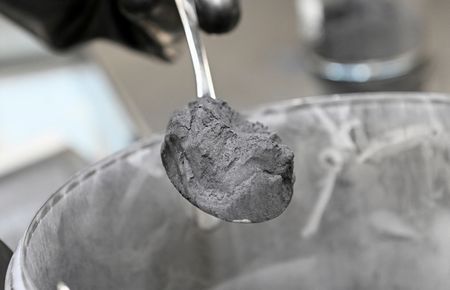By Divya Rajagopal
TORONTO (Reuters) – North American graphite miners are lobbying the US government to impose a 25% tariff on three graphite products sourced from China in order to counter Beijing’s monopoly on a key material used in automobile batteries.
If successful, the move will pit the miners against their main customers- the original equipment manufacturers (OEMs) and add to tensions with China, which controls the majority of the critical metals used in the world’s electric vehicles and other motors.
The U.S. government is set to decide in May whether to bring graphite into the list of minerals that attract the higher Section 301 tariff.
The Section 301 tariff was introduced by former U.S. President Donald Trump after his administration found China’s “acts, policies and practices related to technology transfer, intellectual property, and innovation are unreasonable and discriminatory”. Many other parts used in electric vehicles are also subjected to additional levies. China has called U.S. 301 tariffs on its imports “discriminatory”.
Graphite was exempted because China accounts for 70% of global output of the material – used to make electric battery anodes, the negatively charged portion of the battery.
The graphite manufacturers depend on offtake agreements with automakers as a basis to raise capital from lenders, but if OEMs can secure cheaper graphite from China, there is no need for them to sign these offtake agreements.
The OEM lobby group opposes the higher tariff and argues that without a credible supply chain from North America it is forced to depend on China, and tariffs make them uncompetitive against Chinese auto makers.
The United States Trade Representative, the body responsible for imposing the levy, did not respond to a Reuters query on the inclusion of China-sourced graphite in the Section 301 list.
Graphite miners told Reuters that allowing the free flow of graphite from China into North America harms their chances of raising capital as auto makers would shun future offtake agreements if they could source graphite from China cheaply.
“If we don’t secure the project financing… we won’t be able to build a north American supply chain,” said Hugues Jacquemin, CEO of Montreal-based Northern Graphite.
Critical minerals such as lithium and graphite have become a flash point as western countries try and reduce their reliance on China for these metals that are key for energy transition.
In October last year Beijing imposed controls on graphite exports from the country to help “better safeguard national security and interests”.
Japan, the United States, India and South Korea are top buyers of China’s graphite according to its customs data.
“Trade protections must be enacted to blunt the effects of China’s ability to overproduce graphite and effectively control the global market,” said Erik Olson, spokesperson of North American Graphite Alliance, a group of Canadian and American graphite producers.
(Reporting by Divya Rajagopal; Editing by Alexandra Hudson)

